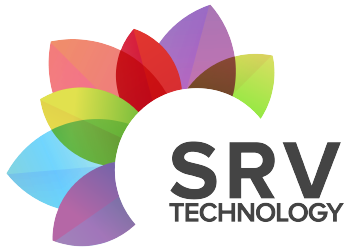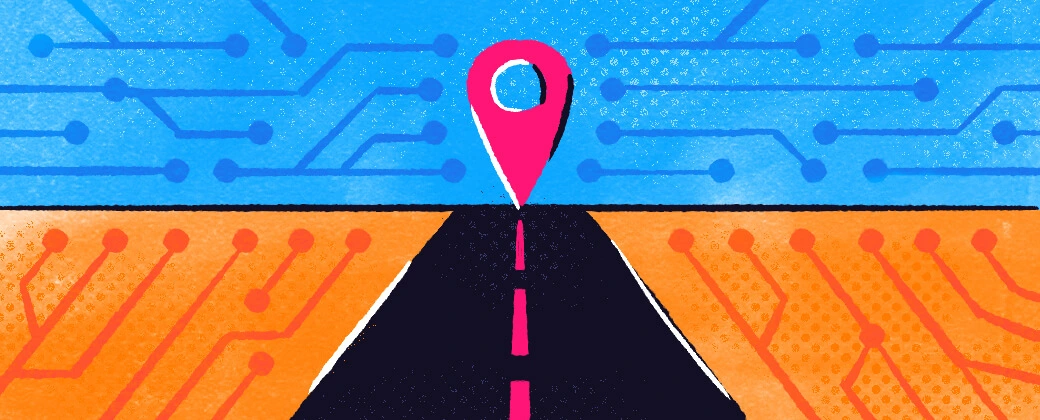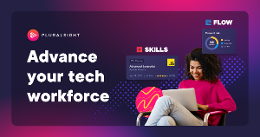We surveyed 150 IT leaders to uncover the top AI skills gaps across federal agencies and how skill development in AI job roles keeps teams workforce ready.
91% of federal IT leaders say their agency is currently using or testing AI—but 72% lack the necessary skill sets to use it effectively.
Where are those skills gaps? What obstacles do government agencies face when adopting AI? How can they become more workforce ready?
We partnered with MeriTalk and surveyed 150 federal IT decision-makers to uncover the answers. Here’s what we learned about AI adoption and effective workforce development strategies for federal agencies.
Table of contents
Federal agencies embrace AI technology but skills gaps impede success
The top IT skills needed for AI careers in federal agencies
Agencies want to upskill for AI jobs but struggle to overcome skill development challenges
Create an upskilling strategy for AI skills in federal agencies
Become workforce ready with AI jobs and skills
Federal agencies embrace AI technology but skills gaps impede success
The majority of federal agencies are already using or testing AI technology. Leaders expect AI to have the biggest impact on data analytics, cybersecurity, and cloud in the next two years.

For AI technology to positively impact these areas, though, agencies need people with the skills to use it. And they’re not quite there yet.
Though 53% of federal IT leaders feel very confident in their agency’s current AI readiness, most of them (43%) had an AI pilot or program fail in the past year because they lacked the in-house expertise to support it.
The top IT skills needed for AI careers in federal agencies
How can government agencies build the in-house expertise needed to use AI tools effectively? Skill development.
All federal IT leaders say they’ll need to upskill or reskill at least a portion of their workforce to use AI. Almost half say they’ll need to upskill at least 51 – 75% of their workforce for AI technology.
The most important AI skills they need to develop? AI ethics, machine learning and AI fundamentals, and data science and analytics.

Agencies want to upskill for AI jobs but struggle to overcome skill development challenges
Government agencies recognize the importance of upskilling to fill skills gaps and improve AI readiness. In fact, nine out of ten federal IT leaders would prefer to build AI careers and skills internally rather than hire.
However, they’re struggling to keep up with the speed of AI adoption. 63% of federal IT leaders say their agency isn’t moving fast enough to prepare their workforce for AI technology.
Part of this is due to obstacles that have slowed progress and made it difficult for agencies to develop skills in house. For one, employees don’t have the opportunity to apply their knowledge in real-world scenarios. They also lack support from leadership. General resistance to change and security concerns also hold them back.

Create an upskilling strategy for AI skills in federal agencies
Less than half of federal agencies have a formal strategy for upskilling. Even fewer have created formal processes and governance, provided hands-on experiences, and otherwise championed AI adoption across the organization.
This needs to change if agencies want to use AI technology to drive their mission forward. These four elements can help you create a skill and workforce development plan that boosts your agency’s AI readiness.

Perform a skills inventory or gap analysis
Before you begin building AI skills throughout your organization, it’s important to understand your workforce’s current skill levels and expertise. Conduct a skills inventory or gap analysis to identify their strengths and areas for improvement.
Some skills to assess include:
- Foundational AI/ML
- AI ethics
- Data analytics
- Critical thinking
- Agile development and project management
The good news? 64% of agencies have already conducted a skills inventory or skills gap analysis to determine where to focus their skill development.
Prioritize learning AI skills for IT operations, security, and data
Once you’ve determined the skills each team needs, focus your upskilling efforts on the domains where AI is expected to have the most impact. For example, federal IT leaders expect AI to have the most impact on data analytics, cybersecurity, and cloud. As such, data analysts, cybersecurity analysts, and cloud engineers should be among the first to build relevant AI skills with role-based learning.
Provide hands-on learning experiences for AI jobs
To accommodate different learning styles and boost skill acquisition, provide a variety of training methods like online courses and hands-on labs where employees can apply new skills in risk-free environments.
Hands-on learning provides a more interactive learning environment and increases skill confidence. (59% of technologists say using hands-on labs and sandboxes alone or with video content is the most effective at preparing them to apply new learning on the job.)
Other learning options to consider include certification programs, mentorships, cross-training, and conferences or events.

Emphasize AI knowledge sharing with non-IT employees
88% of government IT leaders say it’s necessary for their agency’s IT department to work with other departments to help them learn and understand the uses and limitations of AI. Unfortunately, 73% feel cultural silos make it difficult to share AI knowledge with non-IT department employees.
While IT professionals will likely be your first priority for AI upskilling, don’t restrict skill development to your tech teams. Cross-functional collaboration is key to expanding AI use cases, driving greater efficiency, and expanding mission capabilities.
To break down those silos, foster a culture of collective learning and knowledge sharing outside of AI jobs. This might include:
- Internal workshops where IT professionals can teach AI concepts to non-technical peers
- Online forums for technical and non-technical employees to share their learnings and ask questions
- Employee training that explains AI technology in easy-to-understand language

Become workforce ready with AI jobs and skills
Learn how to build AI readiness and fill skills gaps with Pluralsight’s tech training and hands-on labs for federal agencies.

Pluralsight C.
The Pluralsight Content Team delivers the latest industry insights, technical knowledge, and business advice. As tech enthusiasts, we live and breathe the industry and are passionate about sharing our expertise. From programming and cloud computing to cybersecurity and AI, we cover a wide range of topics to keep you up to date and ahead of the curve.
source: pluralsight.com





.jpg)




.jpg)